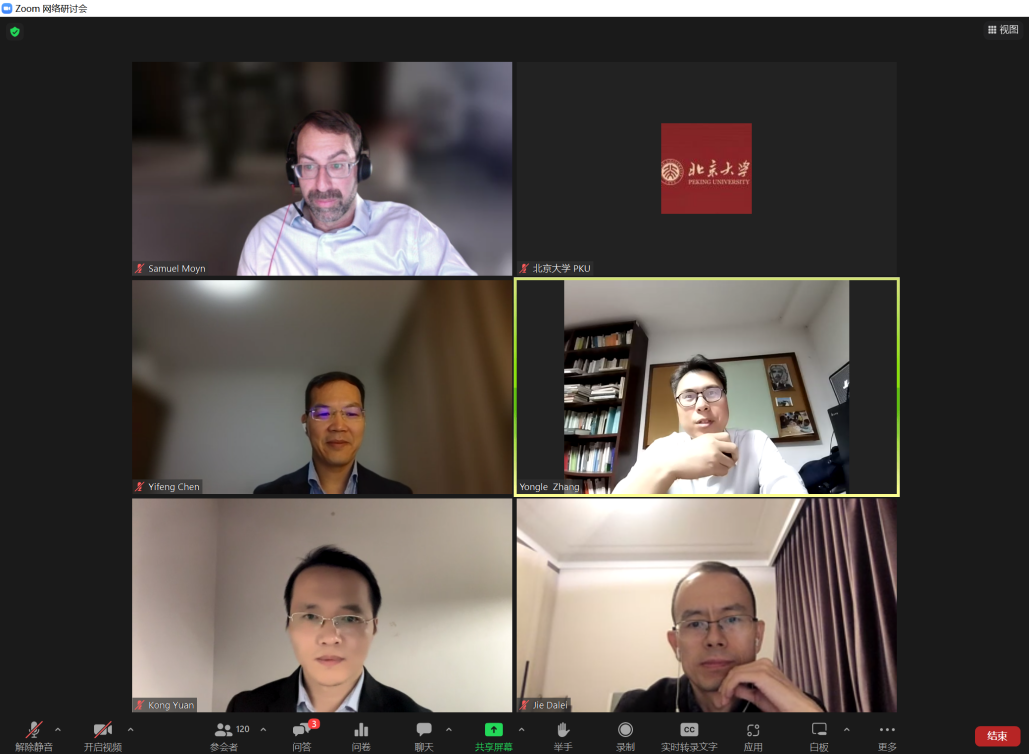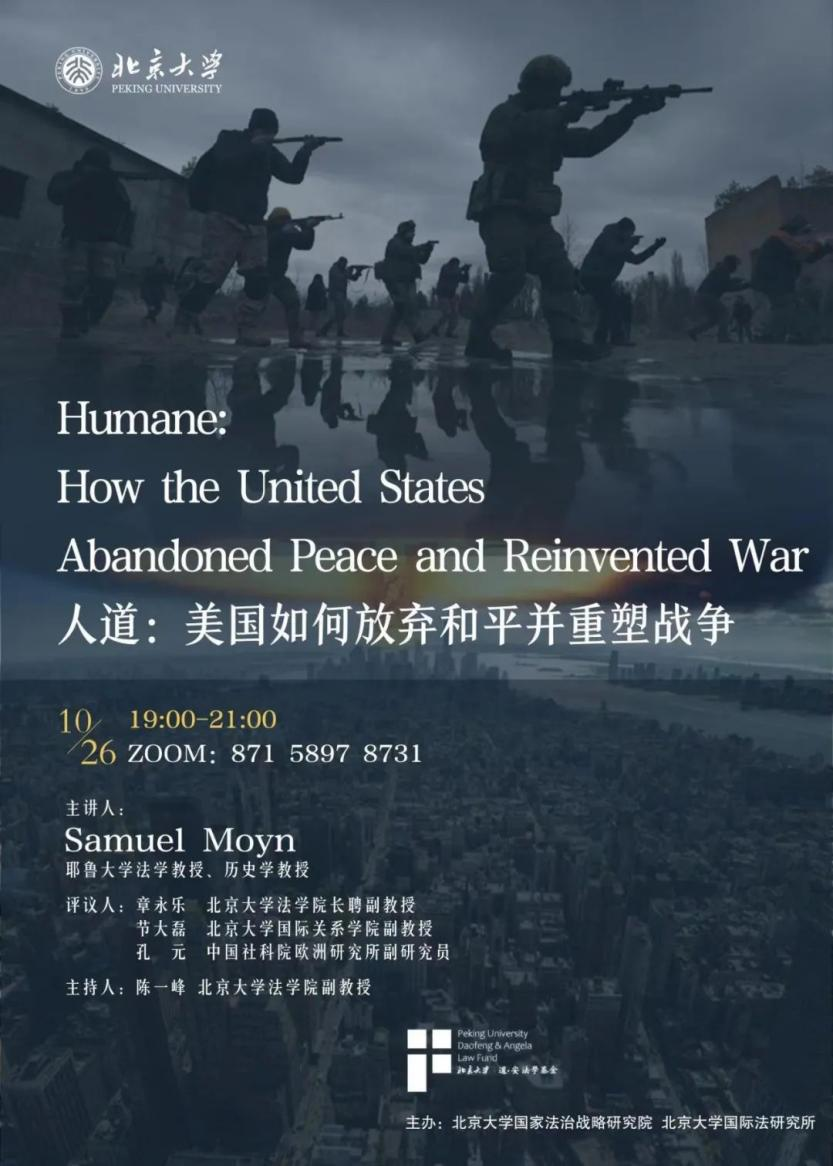The 18th lecture of the"Empire, International Law, and Global Order" series, entitled " Humane: How the United States Abandoned Peace and Reinvented War", was Successfully Held.
Date:2023-04-17
On the evening of October 26th, 2022, the 18th lecture of the "Empire, International Law, and Global Order" series was successfully held online at Peking University. The lecture, entitled "Humane: How the United States Abandoned Peace and Reinvented War", was delivered by Samuel Moyn, a law and history professor at Yale University. It was hosted by Associate Professor Chen Yifeng of the Law School, and featured panelists including Zhang Yongle, tenured associate professor of the Law School, Associate Professor Jie Dalei of the School of International Relations, and Assistant Researcher Kong Yuan of the European Studies Institute of the Chinese Academy of Social Sciences.

Moyn's lecture started with the story of former U.S. President Obama receiving the Nobel Peace Prize, which to some extent reshaped the anti-terrorism war previously launched by the United States. As a leader of a superpower, the existence of enemies is inevitable, and Obama believed that the longevity of war is an important feature of human society, but he also promised that America's wars would be humane.
Professor Moyn pointed out that the earliest document embodying the concept of "humanity" in modern warfare law was the Geneva Convention signed in 1864. At the same time, the Russian writer Tolstoy put forward his own criticism of the humanity in the law of war through the mouth of Prince Andrew in his work "War and Peace".He believed that humane warfare might prolong the duration of war, whereas brutal warfare could be shorter. The violence in brutal warfare might be less than that in humane warfare. Tolstoy's perspective made us aware of the potential adverse effects of humane warfare. Professor Moyn then cited Tolstoy's other views to illustrate this issue. Tolstoy believed that the humanization of slavery was also a mistake because it prolonged the duration of slavery, and its more important significance was to safeguard the interests of slave owners. Tolstoy believed that the humanization of violence could actually lead to its perpetuation. Professor Moyn pointed out that the original idea behind the Geneva Convention was to use humanity to ultimately abolish war, but the result may have been to consolidate war instead.
After the 1970s, there was a trend of humanitarian reform in the law of war, such as the inclusion of the distinction principle, which requires a differentiation between combatants and non-combatants in warfare. However, such a trend of humanitarianism does not aim to limit war, but rather to delineate the boundaries of hostile acts. In the recent US counter-terrorism wars, weapons such as drones have indeed made war more "humane," but at the same time, they have dragged the US into an endless quagmire of war. Professor Moyn reiterated that he did not believe that humanity in war is harmful, but it is necessary to remain vigilant about humanity in war as it may consolidate the position of war.
Professor Zhang Yongle believes that the causal relationship between the humanization of war and the prolongation and sustainability of war, as expounded by Professor Moyn in this lecture is inspiring. He raised two questions: first, whether "armed conflict" is still the basis for defining "war": the cruelty of traditional military battlefields seems to have decreased, but war has actually opened up new battlefields, such as economic sanctions, trade wars, cyber warfare, etc. Especially economic sanctions, which were originally introduced as a deterrent measure to prevent larger armed conflicts but have undoubtedly become a part of war now. If the definition of "war" is expanded, the causal relationship expounded by Professor Moyn may undergo new changes. Secondly, how will Professor Moyn compare his work with Karl Schmitt's discourse on the reform of war law, as Schmitt also explored a series of "unexpected consequences" of the reform of twentieth-century war law: with the aim of ending war, but ultimately turning "limited war" of the 19th century into "unlimited war."
Professor Jie Dalei believes that Professor Mohn's logic that humanitarianism in war may prolong war is also applicable to the debate on nuclear strategy during the Cold War, that is, more "humane" tactical nuclear weapons may lower the threshold of nuclear war. Then, Professor Jie Dalei raised three questions: first, whether the cases in Moyn's book are too focused on the United States' anti-terrorism war; second, how to view the role of the US national security agencies in continuing the anti-terrorism war; and third, if we accept that the possibility of war always exists in the anarchic international system, should human efforts be focused on reducing the cruelty of war rather than trying to eliminate it?
Researcher Kong Yuan first expressed his gratitude to Professor Moyn for his enlightening lecture and work, and pointed out that Professor Moyn's work, on the surface, is about the history of thought of war law, but in essence, it is about interpreting the legal and moral construction of the United States as a "free empire". Researcher Kong Yuan agrees with Professor Moyn that all history is the path of contemporary history and that historical writing must respond to contemporary political issues. Researcher Kong Yuan mainly raised three questions: first, he believes that Professor Moyn did not provide an explanation for the United States' motivation to launch a "permanent war"; second, Professor Moyn did not provide an answer to how to end this "permanent war". In some passages of the book, he seems to advocate opposing US violence through "non-violence"; and third, how does Professor Moyn view the rising "restraint" school of thought?
At the end of the lecture, Professor Moyn responded to questions from the audience on topics such as "War and Law", "War and Technological Development", "Comparison of Humanity in Animal Slaughter and War", and "The Role of International Humanitarian Law in War".
The lecture was jointly organized by the National Strategy for Rule of Law and the Institute of International Law at Peking University, with the aim of promoting further in-depth research on international humanitarian law and critically reflecting on the humanization movement of armed conflicts from a critical perspective. The lecture attracted more than 100 faculty and students from within and outside the university, with a warm response and complete success.




